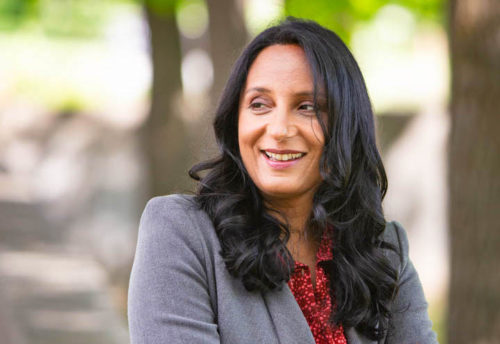
With Earth Day approaching, the University of Guelph’s new Guelph Institute for Environmental Research (GIER) is announcing its first round of funding toward eight diverse research projects, all aimed at solving global environmental problems.
GIER is providing $111,000 through its Small Grants Program for projects ranging from green approaches to removing contaminants from water, to the impact of fish hatcheries on sustainability, to the establishment of a northern research hub.
The institute was created in late 2019 to tackle the world’s environmental problems through innovation and interdisciplinary collaborative research, building on U of G’s expertise in the environment and sustainability.
“More than ever before, we are seeing that the environment is a complex, interconnected system in which conversations between researchers in the natural sciences, social sciences, humanities and the arts need to happen,” said Prof. Madhur Anand, inaugural director of GIER.

Interdisciplinary research and new partnerships spanning all seven of U of G’s colleges will help solve current environmental problems and avert environmental catastrophes in the future, she added.
The researchers receiving funding under the Small Grants Program are as follows:
- Prof. Michael Denk, Chemistry: a green approach to removing chlorinated contaminants from water and soil
- Prof. Amanda Boetzkes, Fine Art and Music: political rationales and ethical depositions that inform cultural responses to climate change in Greenland
- Profs. Philip Loring, Geography, Environment and Geomatics, and Nicolas Brunet, Environmental Design and Rural Development: impacts of fish hatchery methods on sustainability, in collaboration with the Shawanaga First Nation near Parry Sound, Ont.
- Profs. Stefan Kremer, Computer Science, and Genevieve Ali, Environmental Sciences: design of a machine learning model to predict flows and floods of Ontario’s Grand River to reduce environmental and health risks and minimize property damage
- Prof. Catherine Bush, English and Theatre Studies: working with artists and scientists on the role of imagination in how we view and respond to the climate crisis
- Profs. Craig Johnson, Political Science, and Kirby Calvert, Geography, Environment and Geomatics: ecological and social impacts of global supply chains for solar panels, wind turbines and chemical batteries
- Profs. Thomas McIlwraith, Sociology and Anthropology; Shoshanah Jacobs and Sarah Adamowicz, Integrative Biology; Nicolas Brunet, Environmental Design and Rural Development; and Daniel Gillis, Computer Science: establishment of a northern environmental research hub at U of G
- Profs. Claudia Wagner-Riddle and Kari Dunfield, Environmental Sciences; Helen Hambly, Environmental Design and Rural Development; and Alfons Weersink, Food, Agricultural and Resource Economics: promoting interdisciplinary research on soil health
Pressing global challenges like the climate crisis and the rapid decline in biodiversity are interdisciplinary in nature, requiring an understanding of human-environment interactions, said Anand.
“The broad range of projects funded so far by GIER reflect that perspective.”
